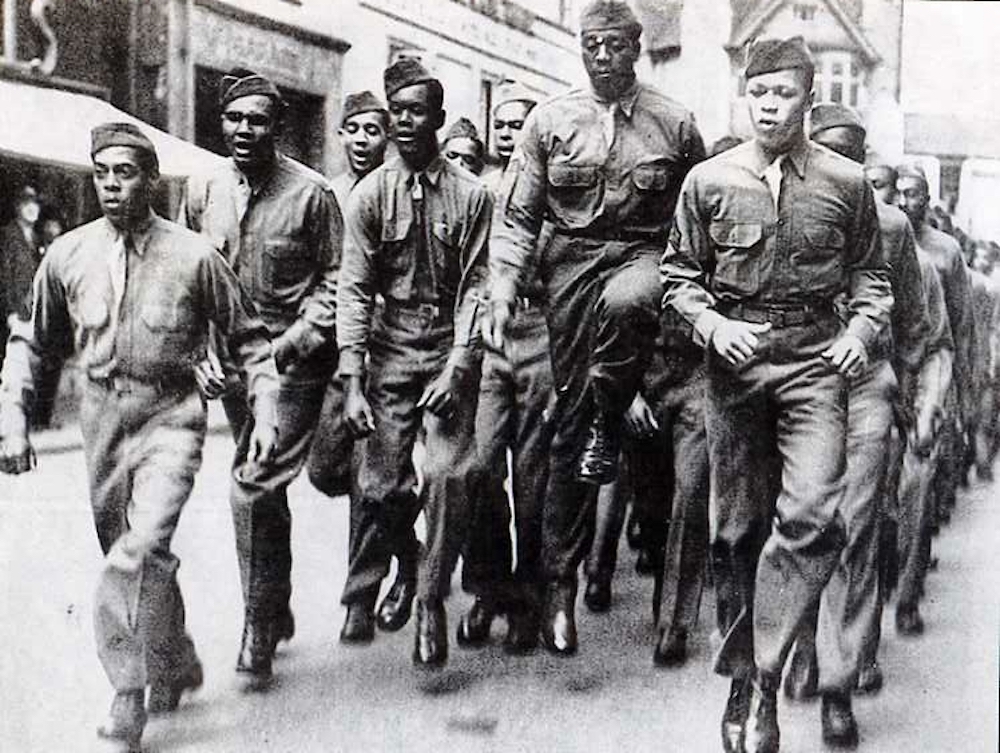
U.S. African American troops in Bristol, England, during World War II. Photo courtesy of Paul Townsend/Flickr.
 Soul food ambassadors: probably not who comes to mind when you think of the African Americans who have served overseas in the U.S. armed forces. Yet no other group of people—neither athletes, nor entertainers—are more responsible for spreading the complex flavors of soul food.
Soul food ambassadors: probably not who comes to mind when you think of the African Americans who have served overseas in the U.S. armed forces. Yet no other group of people—neither athletes, nor entertainers—are more responsible for spreading the complex flavors of soul food.
As the United States flexed its military muscles during the 20th century, black GIs were thrust into contact with epicureans abroad. And so they taught the world about delicacies like American-style barbecue, chitterlings, and fried chicken. Motivated to settle overseas by the enduring racism within the United States and the relative social acceptance African Americans received in other countries, many former U.S. servicemen and women opened up restaurants, shared their beloved recipes, and turned their deeply regional soul food into a global phenomenon.
Soul food went on the move within the U.S. military. African-American troops have a long history of fighting on foreign soil, starting with the Spanish American War in 1898, when thousands of black soldiers helped secure victories in Cuba and the Philippines. By World War I, the number of enlisted African-American men and women had swelled to several hundred thousand. Both white and black troops serving overseas missed the comfort foods they had loved at home in the American South, and they lobbied for their military rations to be more soulful. The Kansas City Star reported one success story in September 1918:
“From the negro and white Southern soldiers who are serving in France comes the cry for yellow yams. The beneficent American government harkened to the desire that was wafted across the sea, and within the next few weeks the toothsome sweet potato will be upon the bill of fare in all the Army camps of this Nation in the fighting, training and working areas across the water . . . That the negro soldiers in France will welcome the arrival of yellow yams is not to be doubted. The letters of many of these men dwell upon the fond memories that they have of the yellow yams in the home life that they left behind.”
Such culinary victories were roundly appreciated, but all too rare. The global spread of soul food really took off after the end of World War II. After the war, recently discharged black military veterans in the European theater stayed overseas to open and operate restaurants. At first, they cooked mainly for African Americans who were active duty military and serving at nearby bases. In some of the countries where the United States had a military presence, like France, Germany, Japan, Vietnam, and Thailand, it was easy for these entrepreneurs to find the cheap ingredients they needed for their recipes, because the locals ate similar foods: chicken, fish, greens, okra, pork, sweet potatoes.
The soul food joints offered troops the chow they wanted, as well as a much-needed haven from U.S. racism. Over centuries of distinguished service since the American Revolution, black troops have endured a paradox. They answered the call to serve even though it meant preserving and protecting a society that didn’t offer them the same opportunities as it handed to whites. In the military, African Americans tended to get the worst assignments, grunt work like making and serving food in the mess operations. White troops antagonized them, and white officers often weren’t much better, especially when the troops were off-duty and off-base. Being able to eat the food they loved helped black GIs persevere.
Homestyle meals also led black troops to an unexpected source of support: foreign foodies who loved cornbread and collards, too. Being in Europe transformed how African-American GIs thought about white people. Friendly European whites treated black soldiers with dignity, and admired black culture. A love for dance and jazz—seemingly strongest in France—had allowed performers like Josephine Baker and Louis Armstrong to make huge—and well-documented—splashes in the 1920s. French curiosity about black culture also sparked a hunger for what would later be called “soul food,” “la cuisine noire,” drawing in adventurous local diners. For black troops abroad, such support from white people must have been a great antidote to the absurdities of military service to segregated America.
The most famous soul food restaurant in Western Europe was Chez Haynes in Paris. Leroy Haynes of Clinton, Kentucky, was a former All-American football player at Morehouse College who had served in the U.S. Army during World War ll. In Europe, Haynes enjoyed the same positive embrace black comrades had encountered earlier in the century. After the war, he decided to stay in France. Haynes found a wife, began an acting career, and in 1949 opened up his Southern-style restaurant, serving all the usual soulful specialties like barbecue, greens, and cornbread. Haynes’ calling card was a dish of stewed pork intestines known as chitterlings or “chitlins,” which soared in popularity in part because the French were already accustomed to eating andouillettes, a sausage also made from pork intestines.
Chez Haynes struggled at first but soon became the center of black life in all of Europe, remaining in business until the 1980s, even after Haynes himself had died. Any night, its tables were packed with military personnel, black celebrities, musicians, and writers. It wasn’t unusual to see Count Basie, Ray Charles, Sammy Davis, Jr., Dizzy Gillespie, Billie Holliday, or Sarah Vaughn in the dining room. White celebrities like Paul Newman, Joanne Woodward, Elizabeth Taylor, Richard Burton, and Peter O’Toole paid visits to the restaurant, too. Even the famed French actress Brigitte Bardot exclaimed that the chitlins at Chez Haynes were formidable (“wonderful”)!
Europe was not the only place soul food thrived; African-American veterans stayed behind to open restaurants in Asia, after serving in Korea and Vietnam. Japan, Vietnam, and Thailand had well-known soul food restaurants that thrived on patronage from both African Americans and Asians. Jack’s American Star Bar in Bangkok, Thailand was fictionally depicted as a restaurant called “Soul Brothers” in the 2007 film American Gangster. Another notable dining spot during the 1960s was the L&M Guest House on Coathang Street in the heart of Saigon (now Ho Chi Minh City), Vietnam. One African-American veteran told me in an interview that during the Vietnam War, L&M catered gatherings deep in the jungle, delivering food by helicopter to black soldiers who had some brief downtime between their assignments. It brought an entirely new meaning to the word “carryout.”
So many aspects of African-American culture have gone global in the past century: the way we dance, dress, style our hair, play sports, sing, talk, and write. African-American service members and veterans were the ones who made soul food, to turn a phrase from hip hop vernacular, “internationally known, and locally respected.” Will they continue spreading the global soul food gospel?
Perhaps not. My brother, Kenneth Lloyd, was a sergeant first class when he retired in 2000 after a 20-year career in the U.S. Army’s military police. He doesn’t remember eating at any soul food restaurant near the military bases where he was stationed in Bosnia, Germany, Haiti, or Panama. Many of today’s active military conflicts are in Muslim countries where pork is taboo and other common soul food ingredients are difficult to obtain. These days, soul food for military men abroad is served up mainly at private parties, or by mess hall volunteers like the late Brenda “Mama” West, who for a decade cooked soul food for wounded warriors at Ramstein Air Force Base in Germany. Life still isn’t perfect for black people in America, but hard-earned civil rights gains have made it less appealing for discharged veterans to spend the rest of their lives overseas. Soul food’s future ambassadors will likely be entertainers, or civilian entrepreneurs seeking opportunity, but we should never forget the foundation laid by our men and women in uniform.




Send A Letter To the Editors